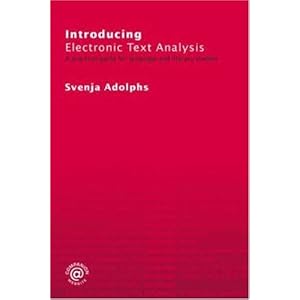
What is language?
Everything, for people. We are symbolic creatures; forging meaning from phenomena is what differentiates us from algae and badgers. Language is our mode of encapsulating and transmitting that meaning. Researchers are now able to analyze our intellectual products–such as literature, and the ways language is used in various disciplines–because of digital tools,
such as electronic text analysis.
Dr. Svenja Adolphs researches data and language, basing her career on these emerging digital tools, and their affect on the realm of scholarly perspectives.
This new research capability has shredded through the ceiling of 20th century means for textual and linguistic analysis. Dr. Chomsky’s 1960s research established the simple failure of human intuition at measuring how well an individual articulates meaning, in both text or discourse. People, even researchers and scholars, are just not objective enough to study something truly innate to themselves. But Dr. Adolphs research on electronic texts demonstrates new analytical means; through impersonal, unbiased analytical technology. We are now able to transcend our limited human faculties in order to more objectively study very basic human abilities, such as language. Technology is able to act as an interim: Evaluating digital corps of literature and writing, sans the perceptual baggage of an all-too-human researcher, and the researcher draws conclusions from the data. Researchers’ worldviews and biases are better suited for synthesizing data; human judgment, as we’re aware, isn’t particularly useful in all evaluative processes. Especially in evaluating something so innate to ourselves.
As Adolphs warns,
Whether you are a student of language or literature, critical theory or history, or if you are studying for a degree in the social sciences, you will probably be working with electronic texts at some point. A project that uses software packages that allow you to manipulate and analyse your data might offer a new perspective on a particular problem. You may also be able to use electronic text analysis to complement more traditional types of analyses in your discipline and thus add another layer to your research.
So we’re on the cusp of a brave new world of academic research, given these provisions for objective scholarly research. Imagine what sensational new ideas scholars will derive from Plato’s Republic, from the remaining, printed scraps of the Kallevalla. Through the objectivity of electronic text analysis, combined with the good minds of scholars, we are careening into a new intellectual sphere. It’s the dawning of new perspectives.


